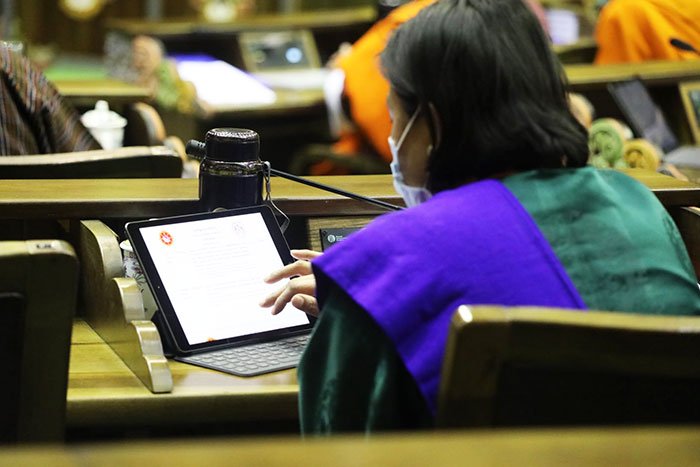MB Subba
As part of Parliament’s digitisation programme, Members of Parliament have switched to the use of iPads from notepads in the House and committee meetings beginning this session.
The move has come at a time when the use of digital technology has become essential for various activities such as conducting virtual meetings due to the Covid-19 situation.

The introduction of iPads has reduced the use of paper (Photo: NAB)
The e-Parliament project is supported by the International Institute for Democracy and Electoral Assistance (International IDEA) which is an intergovernmental organisation that works to support and strengthen democratic institutions and processes around the world, to develop sustainable, effective and legitimate democracies. International IDEA is headquartered in Stockholm, Sweden.
As per the standard operating procedure (SOP), the device will be returned to the secretariat at the end of the term of MPs, a secretariat official said.
A press release from the National Assembly states that the transformation is also in keeping with the national initiative to conserve resources and enhance efficiency in parliamentary works by going paperless.
The main objective of the use of electronic devices is to enable online sharing of documents, collaboration on documents, enable easy access to documents and prompt retrieval via Google Docs, Google Sheets and Google Drive.
The National Assembly of Bhutan targets to make all Acts available in digital form by the beginning of 2021.
Speaker Wangchuk Namgyel said that it was important for Parliament to adapt to the digital platform with the change in time. He said the House was trying to go 100 percent paperless in future sessions.
Deputy Chairperson of the National Council, Jigme Wangchuk, said that the use of iPads had improved work convenience. The need to print paper went down by 90 percent, he said.
Athang Thedtsho MP Kinley Wangchuk said that the iPad had become useful not only in the House but also committee meetings. “These days we need to have lots of virtual sessions/meetings with international agencies.”
The platform that is currently being used is the government Google suites.
The use of digital devices is also aimed at encouraging and helping MPs manage their schedule with the use of Google Calendar and Google Meet to hold meetings.
It’s not only Members of Parliament but also the Secretariat staff that have started functioning through the use of the electronic device. The secretariat has also initiated emphasis on the use of Dzongkha.
As per the Parliament’s plan, it is not only aimed at making Parliament more efficient, but also more transparent.
Gradually, Parliament, as per the project, aims to go paperless. The digitisation programme is expected to centralise the management of the operating systems and software applications.

